South America Newsletter June 2024
This month we bring you news from Colombia, Venezuela, Argentina, Ecuador, Brazil, Chile, Paraguay and Peru.
Highlights are:
- Colombia: More from Amnesty on the need for police reform, opening with a song and dance video to remind us of the violence suffered by demonstrators during the General Strike.
- Colombia: The government uses a mixture of negotiation and force to halt the ongoing violence in the country.
- Venezuela: Please respond to the Urgent Action demanding medical care for three political prisoners who have been deprived of treatment for months.
- Argentina: Please sign an Urgent Action demanding the release of a lesbian human rights activist charged with painting graffiti.
- Argentina: In a second Urgent Action, Amnesty is demanding the withdrawal of a new pensions’ law which would deprive most pensioners of their pension.
- Ecuador: In this Urgent Action, Amnesty is demanding that the Ecuadorian authorities protect nine girls and their families without demanding they first abandon their activism.
- Brazil: More on police killings, this time in Sao Paulo, and how corrupt police are helping to despoil the Amazon.
- Chile: Amnesty is calling for a full investigation of three senior officers of the Carabineros for their excessive use of force during the 2019 demonstrations.
- Paraguay: In a new report, Paraguay’s Bill of Health, Amnesty has identified that severe and unequal gaps in access to Paraguay’s public health system.
- Peru: The Peruvian government published a presidential decree classifying trans identities as mental health conditions.
COLOMBIA
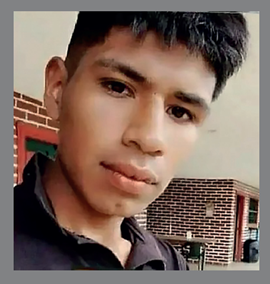
José Hernan Tonorio Mestizo, indigenous youth leader, killed 4 July 2023, Cauca.
Amnesty International has issued a new report on grave abuses committed by the police during the National Strike of three years ago. This opens with musicians and dancers performing to remind us of the violent events where their leader lost an eye to a rubber bullet. Protesters were killed, others lost their eyes or were sexually abused. Many of these injustices remain unpunished. Some who reported the abuses have been threatened and had to flee the country. How is it possible that a police reform that ensures that these events never happen again is not part of today’s political agenda?’
Programa ‘Somos Defensores’ (We are the Defenders) lists the 168 social leaders and human rights defenders killed by ex-guerrillas, paramilitaries and criminal gangs in 2023, a 14% decline on 2022. However, the number of forced displacements doubled while there was also an increase in kidnappings and forced disappearances. Overall, there was no letting up in the violence in mainly rural areas previously occupied by FARC guerrillas, and now fought over by two FARC dissident groups, the ELN (National Liberation Army), Gaitanista paramilitaries and organised crime.
President Petro is persisting with peace initiatives and Colombia has signed the first point of a six-point deal with ELN guerrillas, following five cycles of negotiations over the last seven years. The agreement last June to set up a National Participation Committee with 80 meetings with 8,500 representatives of social organisations and communities enabled this first breakthrough.
Colombia has also announced peace talks with Iván Marquéz, former FARC leader who reneged on the Peace Accord and founded a new guerrilla group called the Segunda Marquetalia, a reference to the town of Marquetalia, where the FARC originally came from. Talks begin on 24 June in Venezuela. However, neither side has declared a ceasefire. Meanwhile, another ex-FARC group, known as EMC (Central High Command), attacked police stations and towns in several places in the Cauca region. The government sent in the Army with the President warning them that “the offensive against the EMC is total”.
The Guardian reports on the starvation of children of the Wayúu indigenous community in La Guajira. ‘Although their resource-rich environment includes assets such as coal and gas and stunning Caribbean beaches, the lack of food and water available in this arid region has left the Wayúu facing a humanitarian crisis.’ Investigators found that the inadequate supply of water is the result of corruption and the lack of trucks and deposits to supply over 1,000 communities and a population of one-third of a million.
Following a 10-day visit, UN experts urge the Government of Colombia to address systemic and institutional racism of people of African descent which they have endured for centuries. Testimonies detailed sexual and gender-based violence, rape as a weapon of war, macro-aggressions, kidnappings, femicides, brutal killings by armed groups and organised crime cartels, extortion, brutal dispossession of lands, forced recruitment of children in armed groups, enforced disappearances, enforced displacement, mutilation and utilisation of children for illegal activities.
VENEZUELA
Amnesty International has released further information for Juan Carlos Marrufo, who has been held in politically motivated arbitrary detention since March 2019. As well as subjecting him to isolation and a lack of drinking water, the authorities have denied him medical testing and treatment. The pattern of events mirrors those suffered by Emirlendris Benitez and Maria Auxiliadora Delgado, who we are also campaigning for and who also require medical attention. Please write to the Penitentiary Minister in this Urgent Action calling on the minister to provide medical attention for the three immediately. Please send your letters c/o the Venezuelan Embassy in London: 1 Cromwell Rd, South Kensington, London SW7 2HW
The Consejo General de la Abogacia Espanola, a body of professional public law lawyers, has denounced crimes and human rights abuses committed in Venezuela and Nicaragua. Blas Jesus Imbroda, President of the body’s subcommittee considering international protection, called for the International Criminal Court to issue an order for the detention of Maduro, noting that the international community should continue to fight for justice.
The Venezuelan authorities have revoked its invitation for a European Union mission to observe the presidential elections scheduled for the 28th of July. The head of the National Electoral Council, Elvis Amoroso, cited economic sanctions as the reason for withdrawing the invitation.
The announcement came two weeks after the EU temporarily lifted sanctions against four individuals linked to the Venezuelan electoral body, including Amoroso, in recognition of steps taken ahead of the election. EU sanctions are only maintained against just over 50 Venezuelans accused of acts of repression.
ARGENTINA
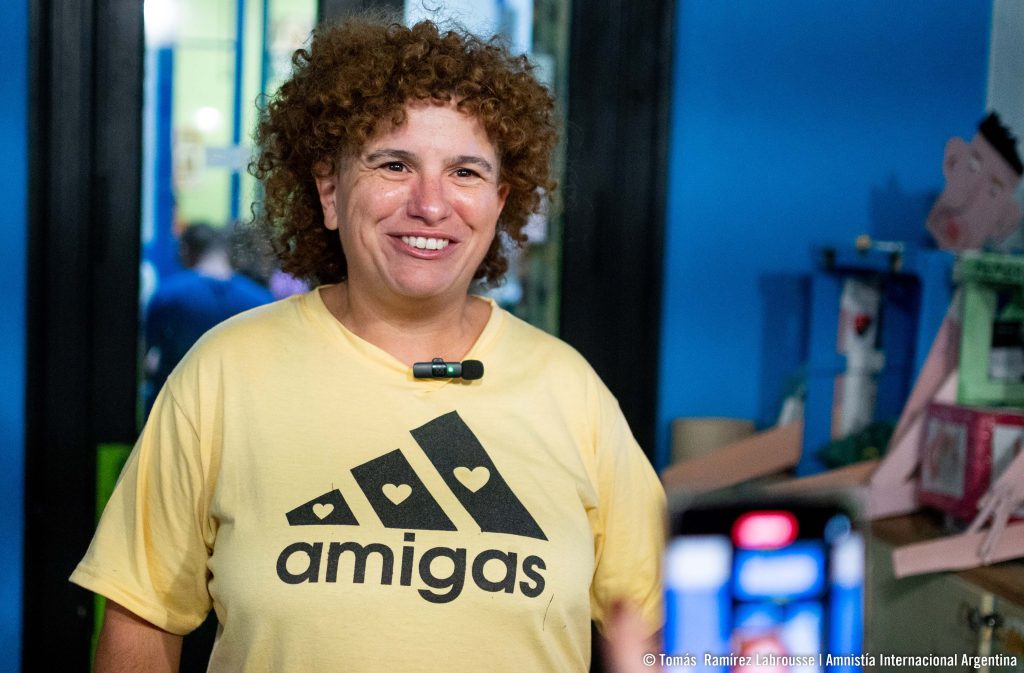
Activist Pierina Nochetti is facing criminal charges of aggravated damage
Pierina Nochetti, a lesbian human rights activist, is facing criminal charges of “aggravated damage” for allegedly painting graffiti in protest questioning the disappearance of a young trans man in the city of Necochea, Argentina. She is facing a sentence of up to 4 years in prison. An Urgent Action, calling on authorities to drop the charge of “aggravated damage” against Pierina Nochetti, has been extended. It appears to be an unnecessary and disproportionate restriction on the right to freedom of expression.
A bill introducing changes to the Argentine pension system – the elimination of the “pension moratorium”, a mechanism that guarantees a pension – is now in the Senate. If approved it would impact on older people’s rights, especially of women and informal workers. In effect, 90% of women and 70% percent of men of pensionable age will not be able to retire. Amnesty International calls for human rights scrutiny, to reject this removal of equal access to pensions impacting on the lives of older people. This Urgent Action asks us to email 12 Senators urging them not to remove the pension moratorium.
The government have been accused of stoking homophobia after an alleged hate crime in Buenos Aires. Four gay women were set on fire, killing three and seriously injuring the fourth. Local human rights defenders have expressed concern that disparaging comments about LGBTQ+ people made by prominent politicians, some now holding high office, are contributing to already high levels of violence against queer communities. Demonstrators carrying banners reading “they killed them” have accused Javier Milei’s government of promoting hate speech and fostering a culture of intolerance.
Human Rights Watch have called on President Milei to reconsider his two nominations to the Supreme Court to take qualifications, experience, diversity and integrity into consideration. One of the nominees, Judge Lijo, has three pending disciplinary investigations. The nomination of two men for the vacancies is also contrary to a 2003 presidential decree calling on authorities to consider “gender diversity” in the selection process. Argentina’s Supreme Court is the only high court on the continent without any women on its bench.
Nora Cortiñas, an iconic Argentine human rights activistand president of the Madres de Plaza de Mayo–Línea Fundadora rights group has died at the age of 94. Cortiñas began her path as a prominent leader in the struggle for human rights when she joined Mothers of Plaza de Mayo, following the abduction of her son Gustavo Cortiñas in 1977, during the 1976-1983 military dictatorship. She was also known for supporting the decriminalization of abortion, the non-payment of foreign debt, the protection of native peoples, and the identification of Argentine combatants buried on the Falklands.
ECUADOR
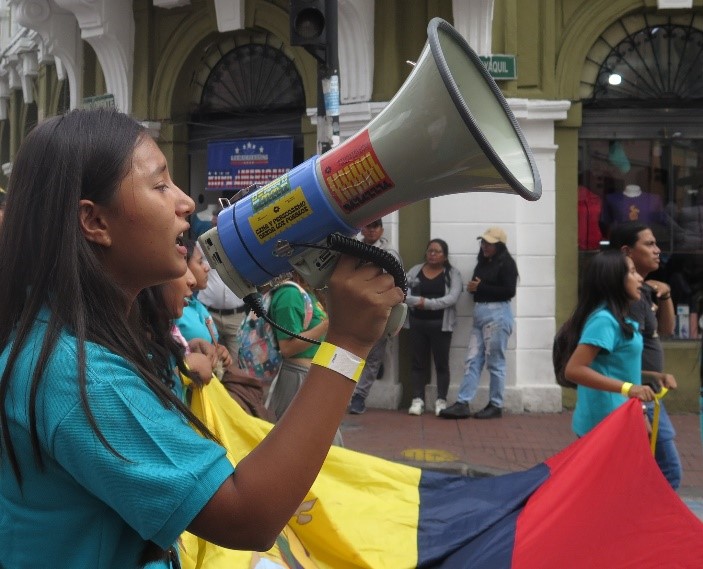 Two months after the 14-year-old climate activist Leonela Moncayo and her family suffered an explosion outside their home, the authorities have not effectively investigated what happened and are conditioning her protection and that of the other eight girls and their families on stopping their activism. Amnesty is demanding that the Ecuadorian authorities effectively investigate what happened and protect Leonela, the other eight girls and their families without these conditions. The deadline for Urgent Action has been extended to 31 July.
Two months after the 14-year-old climate activist Leonela Moncayo and her family suffered an explosion outside their home, the authorities have not effectively investigated what happened and are conditioning her protection and that of the other eight girls and their families on stopping their activism. Amnesty is demanding that the Ecuadorian authorities effectively investigate what happened and protect Leonela, the other eight girls and their families without these conditions. The deadline for Urgent Action has been extended to 31 July.
BRAZIL
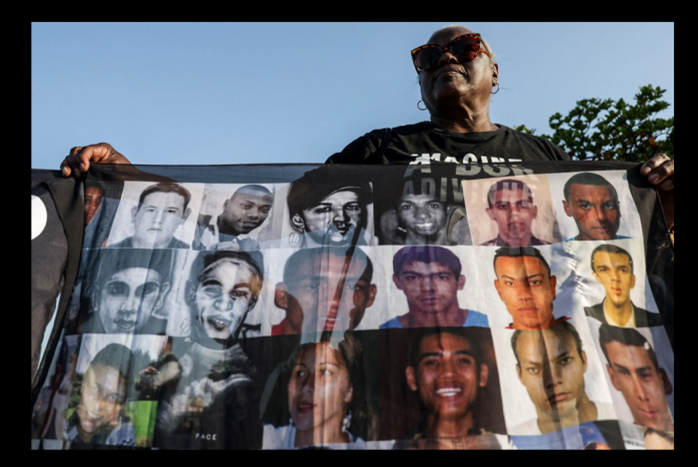 A resident protests a deadly police operation in Sao Paolo, September 2023Insight Crime states that ‘Killings by police rose sharply in the state of São Paulo in the first two months of 2024, as authorities continue to rely on repressive tactics to try to curb crime, a strategy that has yet to produce any long-term results.’ Police killings increased by 94% to 134 in the first two months of 2024. An investigative report by the São Paulo Police Ombudsman accused police of five extrajudicial executions since January, as well as torture and home invasions. The Ombudsman has described the operation as displaying “tones of revenge.”
A resident protests a deadly police operation in Sao Paolo, September 2023Insight Crime states that ‘Killings by police rose sharply in the state of São Paulo in the first two months of 2024, as authorities continue to rely on repressive tactics to try to curb crime, a strategy that has yet to produce any long-term results.’ Police killings increased by 94% to 134 in the first two months of 2024. An investigative report by the São Paulo Police Ombudsman accused police of five extrajudicial executions since January, as well as torture and home invasions. The Ombudsman has described the operation as displaying “tones of revenge.”
CMIU’s Anti-corruption Centre finds that corruption in Brazil facilitates illicit logging and mining activities across the Amazon rainforest. However, corruption extends beyond the fraud, embezzlement, and laundering schemes frequently identified in the mainstream media. Off duty police officers help to accelerate the destruction of the Amazon. They collaborate with illegal loggers or miners to collect and pay bribes, extort local businesses, quash resistance from environmental defenders, and coerce or co-opt citizens into informal work.
Good news! Amazon Watch reports on how a change in the government of Brazil and a ruling by the Supreme Court have helped indigenous communities to legalise 800,000 hectares they occupy. ‘These victories, as well as the growing Indigenous Women’s movement across the Amazon, restore and inspire us to continue our work to protect and defend the Amazon and climate in solidarity with Indigenous peoples.’
CHILE
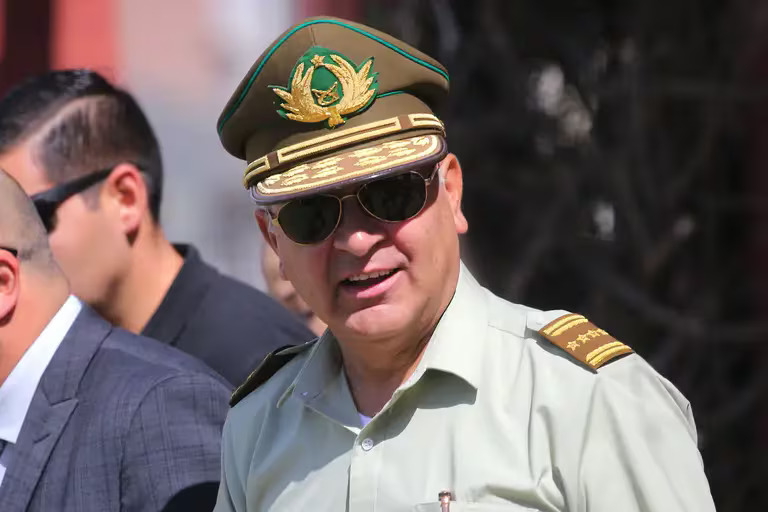
Director General of Carabineros, Ricardo Yáñez, has now avoided being forced to resign despite indictment
In January an indictment was served against three current and former senior commanders of Carabineros de Chile, relating to the protests in 2019. This included the current Director General of Carabineros, Ricardo Yáñez. The indictment was to be “formalized” (forcing Yáñez to resign) in May. This has now been postponed till October 1st. Amnesty International has sent a letter to the National Prosecutor calling for full accountability for the violations committed during the social outbreak and the zealous safeguarding of the independence of public prosecutors’ role and work.
Last month we said charges have been brought against a specific Carabineros officer, Claudio Crespo, who is accused of blinding Gustavo Gatica in November 2019. Regrettably, a trial date for Gustavo Gatica’s trial preparatory hearing, initially scheduled for 26 April, was also postponed until 9 August. Gustavo’s legal counsel are appealing this decision. We have not been asked to take further action at this stage.
In Amnesty’s 2023 report on Chile it highlighted that during 2023 legislation was introduced that increased legal protection for the police. Meanwhile impunity persisted for human rights violations committed during protests in 2019. Also refugees and migrants are still subject to discriminatory measures and faced obstacles to international protection. Violations of the rights of LGBTI people, Indigenous Peoples and women continue.
PARAGUAY
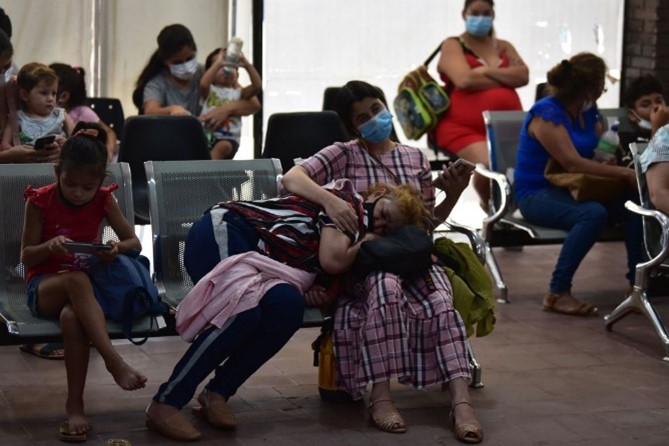 In a new report, Paraguay’s Bill of Health, Amnesty has identified that severe and unequal gaps in access to Paraguay’s public health system, caused by under-investment and inefficient use of resources, are putting people’s lives and health at risk and seriously affecting their income. Paraguay is a party to the International Covenant on Economic, Social and Cultural Rights, which identifies primary health care as a basic and mandatory right.
In a new report, Paraguay’s Bill of Health, Amnesty has identified that severe and unequal gaps in access to Paraguay’s public health system, caused by under-investment and inefficient use of resources, are putting people’s lives and health at risk and seriously affecting their income. Paraguay is a party to the International Covenant on Economic, Social and Cultural Rights, which identifies primary health care as a basic and mandatory right.
PERU
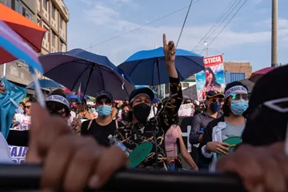 that, on 10 May, the Peruvian government published a presidential decree classifying trans identities as mental health conditions in the country’s Essential Health Insurance Plan, which lists insurable health conditions for insurance policies. The Health Ministry has since affirmed that it does not view LGBT identities as “illnesses,” but the decree remains in place despite heavy criticism from Peruvian human rights organizations and activists.
that, on 10 May, the Peruvian government published a presidential decree classifying trans identities as mental health conditions in the country’s Essential Health Insurance Plan, which lists insurable health conditions for insurance policies. The Health Ministry has since affirmed that it does not view LGBT identities as “illnesses,” but the decree remains in place despite heavy criticism from Peruvian human rights organizations and activists.
Peru currently does not allow same-sex couples to marry or enter into civil unions, does not have a procedure for trans people to change their documents to reflect their gender identity, and does not have civil laws prohibiting discrimination against LGBT people.
All the best,
South America Team – Richard Crosfield (Colombia and Brazil), David Rogers (Argentina and Chile), James Baird (Venezuela) and Graham Minter (rest of South America). And please don’t forget that you can follow us on our Facebook page and Twitter.
